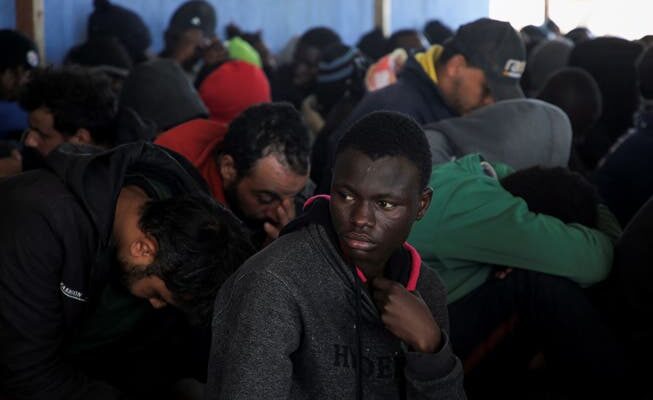Eritrean Kidane Zekarias Habtemariam led an organization of people smugglers who held tens of thousands of migrants captive in Libya. He is said to have personally tortured and raped.
For many, Libya is becoming a trap: migrants picked up by the coast guard near the capital, Tripoli.
An Eritrean whom Dutch authorities describe as one of the most feared and cruel people smugglers was arrested in Sudan on New Year’s Day. Kidane Zekarias Habtemariam was arrested as part of an international police operation, as Interpol announced on Thursday. Kidane was the target of several international manhunts, and the Netherlands included him in theirs List of most wanted criminals.
According to the investigators, the human smuggling organization he heads lured tens of thousands of refugees and migrants from Eritrea, Ethiopia, Somalia and Sudan to Libya by promising to take them to Europe by boat. In Libya, however, the migrants were then held captive in the town of Bani Walid, south-east of the capital Tripoli, sometimes several thousand at a time. The migrants were forced to call their families to have them transfer the equivalent of thousands of francs. Those migrants who could not raise the money were tortured. Some victims have accused Kidane of personally torturing and raping migrants.
Kidane was extradited to the United Arab Emirates after his arrest, where he faces charges of money laundering. The Emirates had co-led the investigation targeting Kidane’s organization’s cash flows with Interpol. The UAE’s interior ministry last week said the arrest would cut off one of the main people-smuggling routes to Europe.
110,000 migrants intercepted since 2017
The migration route through Sudan to Libya is one of the world’s most important and dangerous. Tens of thousands flee every year from the countries in the Horn of Africa, which have been shaken by crises for decades. They are fleeing, for example, from unlimited military service in Eritrea under the repressive military dictatorship there, or from the terror of the Islamists from al-Shabab, who still control large areas of Somalia. The political instability in Sudan, where the military has been trying to smother a democratic uprising for four years, is driving many residents to flee.
Many of the migrants want to get to Europe via Libya. Only a small part succeeds. Since 2017, more than 110,000 migrants have been intercepted by the Libyan Coast Guard and brought back to the mainland. Libya has been highly unstable since the fall of dictator Muammar al-Ghadhafi in 2011, with militias competing for territory and resources. Human smuggling thrives in the chaos – and characters like Kidane Zekarias Habtemariam.
An article in the “Irish Times” described the conditions in Bani Walid in spring 2020 in detail. Hundreds of inmates shared three restrooms, and once a day they had to queue outside the warehouse to call their families and ask for money. Guards beat detainees with electric cables or dripped hot, melted plastic onto their bodies.
According to the report, the prisoners were often left without water, food and medical care. Some eventually became so weak that they died. Migrants called Bani Walid “Ghost City” (ghost town) because many had disappeared without a trace.
One victim said of the head of the organization: “Kidane was known for beating people like animals.” Kidane shared the warehouse complex with another smuggler. Inmates said the two smugglers had organized football games in which their prisoners had to play against each other. The victorious smuggler was allowed to choose a woman as a prize, whom he then raped.
Spectacular escape from the court
Kidane’s current arrest is not his first. In February 2020, he was arrested in the Ethiopian capital Addis Ababa after a victim recognized him on the street. Kidane was charged but fled the courthouse before a hearing. Several police officers were arrested on suspicion of enabling Kidane’s escape against bribery. Kidane was sentenced in absentia to life imprisonment.
Since his escape in February 2021, Kidane has been free again. According to Interpol, he continued his criminal activities and traveled with forged documents. He was caught using biometric data and financial traces that he left behind during his travels. Along with Kidane, his brother was arrested. Interpol announced more arrests in Kidane’s network.
